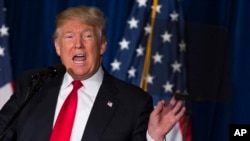Japan's ambassador to the United States weighed in on the U.S. presidential election debate Friday by arguing against the "America first" stance of Republican presidential candidate Donald Trump and stressing the importance of the U.S.-Japan alliance.
Without mentioning Trump by name, Kenichiro Sasae told a Washington forum that Japan had come up unexpectedly in the election debate, showing that nothing could be taken for granted in terms of the long-standing U.S.-Japan alliance.
"In the presidential elections, there are arguments whether the United States is going for the isolationist stance," Sasae said. "I don't want to see that kind of United States.
"I want to see the United States to be strong and come with a strong robust position, not really thinking of the United States only," he said.
Trump, the presumptive Republican nominee for the Nov. 8 presidential election, has portrayed Japan, a long-time treaty ally of the United States, as a free-rider on security. He has suggested that Tokyo might need nuclear weapons to ease U.S. financial commitment to its defense — anathema to the only country ever attacked by atomic bombs.
"I know that there has to be a debate about how to get this country strong but the question is whether you could be strong without a proper role around the world," Sasae said.
"It is important not to undermine: one, the value of the U.S.-Japan alliance; two, the geopolitical implications of emerging or resurgent powers in the world; three, the capability and strength of the United States."
Sasae also stressed the importance of the 12-nation Trans Pacific Partnership trade deal currently held up in the U.S. Congress, saying its passage was crucial to maintaining U.S. economic leadership in Asia.
Trump outlined a clear "America first" foreign policy in a speech late last month, vowing that if he were elected president, U.S. allies in Europe and Asia would have to fend for themselves if they did not pay more for the U.S. defense umbrella.
In spite of concerns in Japan about the implications of a more isolationist U.S. foreign policy, especially in the face of an increasingly powerful China flexing its muscles in Asia, Japan's prime minister said on Thursday that Tokyo hoped to be able would work with whoever becomes U.S. president.
Shinzo Abe said Japan's alliance with the United States was the foundation of peace and prosperity in Asia and would be increasingly important regardless of who was president.





